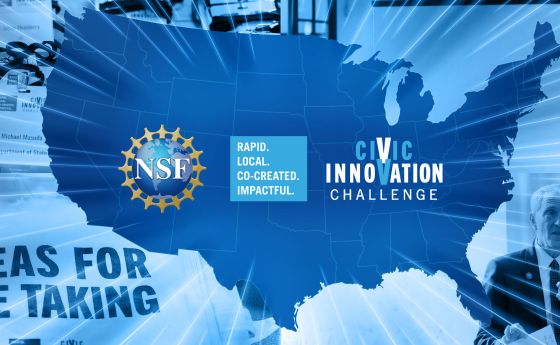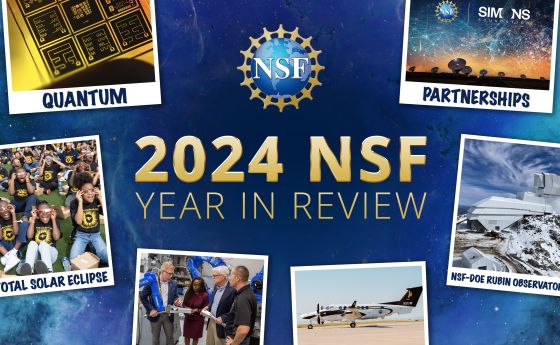
NSF 101: 5 tips on how to work with an NSF program officer
Are you an undergraduate student thinking about how to get funding for graduate school? An early-career researcher looking to launch your new lab? An established researcher with dozens of years of funding from NSF under your belt? Whatever the phase of your research career, it is a good idea to reach out to an NSF program officer as the first step in the application process.
Program officers are the heart and soul of NSF. They themselves are researchers - experts from the research community who guide grant proposals through Merit Review, part of the process that determines if a proposal is funded. Program officers are a valuable resource for both applicants and researchers who have been funded, as they can provide insight and often give direct feedback.
Don’t be intimidated to reach out to a program officer—they are there to help. The myth that reaching out might hinder your chances couldn’t be further from the truth! In fact, you may be surprised at how helpful your program officer can be.
Here are five tips from NSF program officers to help you work with them:
1. Do your homework
- If this is your first time interacting with NSF and you don’t know or have a program officer for an active award, you can search the NSF funding website. There, you can search using keywords or click through the various research areas to explore funding opportunities for which you might be eligible.
- Read through relevant policies and solicitations, and search through the NSF awards database for recent awards made in your field of interest. This can give you a clue as to what is possible, and your program officer will appreciate that you have done your research!
- Each funding opportunity has one or more associated program officers. If you already know which program you would like to apply to, you can find the right contact listed there. NSF is a small community and program officers communicate with each other daily. They may direct your question or relevant information to a colleague.
- If your research idea spans multiple science and engineering disciplines, you may want to explore NSF’s interdisciplinary research opportunities. These opportunities fund ideas that try to address complex societal or scientific problems and will require transdisciplinary expertise to develop a solution.
2. Reach out as early as possible
- Anyone can reach out to an NSF program officer—at any stage of their career, no matter their institution. Even if you are in the early stages of planning your proposal, reach out to an NSF program officer as early as possible. Don’t wait until the deadline, as there is only so much a program officer can do at that late stage.
- Program officers can provide general advice on writing proposals for NSF and tell you if your idea is a good fit for their specific program and how it works. They can also tell you how proposals are evaluated for their intellectual merits and broader impacts, information that can be helpful as you develop your proposal.
- Program officers read hundreds of ideas a year, so they are plugged into the current trends across the science and engineering enterprise. Even if your idea doesn’t align with that particular program at that time, program officers can point you toward other contacts and programs that may be a better fit for your proposal.
3. Continue to stay in contact with your program officer
- Regardless of whether your proposal is selected for funding, you should continue to stay in contact with your program officer in the post-review process. Depending on how each program conducts its review, program officers can provide feedback that you might consider using in your next proposal.
- If your proposal is awarded funding, you need to keep your program officer updated on your progress, including any upcoming publications and significant findings. They may be able to help you amplify your exciting research news.
- Conversations with your program officer are a two-way street. This information helps program officers stay up to date to understand the latest research needs of the community and may potentially lead to new programs to meet those needs.
4. Please be patient
- Program officers are individuals who have different approaches to administering their programs within the culture and traditions of their offices. Some prefer email, while others prefer to schedule phone calls to talk about your proposal.
- Program officers are human too. They are often busy running proposal review panels, writing reports or helping other applicants. Don’t be discouraged if you don’t get a reply initially, and try reaching out again later.
- By the same token, please heed the advice of a program officer. For example, if a program officer advises you to revise your concept before you contact NSF, consider doing so.
5. Recognize that there are limits to what program officers can do
- Program officers are charged with directing fair and equitable Merit Review, so there is a limit to the information they can share. For example, they aren’t able to discuss if your proposal has been recommended for funding or declined until after the award process is completed, after which reviews are provided to you.
- Certain questions regarding proposal or award budgets can only be answered by your Sponsored Program Office if you have one. Your program officer will refer you back to your institution on questions about indirect costs, how to categorize employees or participants, and specific organization policies.
- They also cannot edit your proposal, suggest which topic you should choose, or explain how to design your study. And please, don’t lobby them to fund your proposal.
Reaching out to an NSF program officer should be among the first steps you take in considering funding from NSF. They are a key resource and provide a wealth of knowledge in your research journey. They can help you achieve your science and engineering goals. Start building a relationship with a program officer today!



